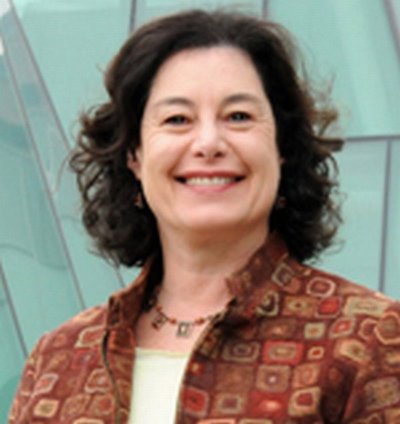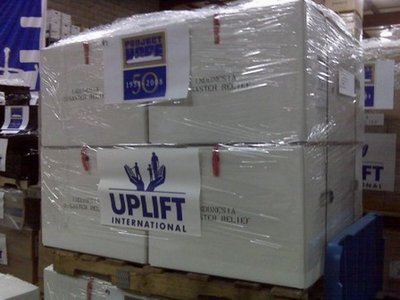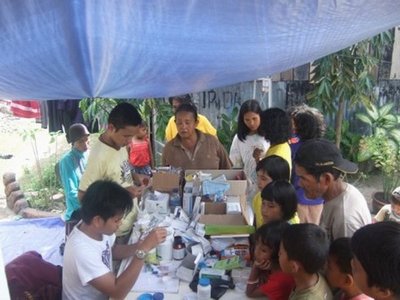October 22, 2009
Uplift International — from earthquakes to human rights – shaking up health
By Emily Lee
Special to UW Health Sciences
Uplift International, a Seattle-based NGO, is run with the support of Beth Rivin, UW research associate professor of law and director of the Global Health and Justice Project. Uplift International not only responds to disasters such as the Sept. 30 earthquake on Indonesias’s Sumatra island, but it also models the multidisciplinary spirit inherent in the field of global health — by incorporating human rights and education into its mission.
When the earthquake hit, Uplift worked with two organizations — the Indonesian Doctors Association and Project HOPE — to send relief supplies and medical professionals to Sumatra.
“We have been working with the Indonesian Doctors Association for many years and have provided educational programs for them in disaster management,” said Rivin, Uplift’s vice president of programs. Rivin also holds adjunct appointments in the departments of global health and bioethics and humanities.
In partnership with Project HOPE, Uplift is sending 11.5 ($940,000) tons of medicines, medical supplies and water filtration systems to Sumatra, including two solar-powered water filtration systems that will be used at a hospital in Padang, the hardest hit city in West Sumatra.
Uplift also linked up with private corporations to help in the relief process.
“FedEx will ship in supplies for us and then local companies will provide free assistance to transport the supplies to the affected area,” Rivin said. “That’s part of our corporate social responsibility model we have used over the last 12 years.”
Roots in Boeing
Uplift International was founded in 1997 to promote the principle of corporate social responsibility in humanitarian assistance. Former Boeing Director of International Trade Mark Schlansky seized a marketing opportunity to use airplanes for delivering medical supplies to Vietnam in 1995. Schlansky continued to direct airlifts and two years later founded Uplift and then quit Boeing to work with Uplift full-time. In 1999, Schlansky hired Rivin as a consultant to provide medical and public health expertise. The two fell in love and got married.
From its very beginning, Uplift International has taken a holistic approach to health.
“We understand that the biomedical model of health is not enough,” said Rivin.
Uplift has provided disaster relief support to Indonesia in the past, including similar relief efforts for the 2006 Sumatra earthquake and the 2004 tsunami in Indonesia’s Aceh province. But Uplift is also continuing advocacy projects aimed at women and children’s rights.
“Around the world, women and children are needlessly exposed to violence” Rivin said. “In Indonesia, we are using a multidisciplinary model. The solution is beyond health and law. We want social workers involved as well.”
After Uplift held its first Health and Human Rights conference in 2003, the NGO formed ties with Indonesia’s Ministry of Education and participated in developing a health and human rights curriculum for first-year medical students. The curriculum is now incorporated throughout all medical schools in Indonesia.
In Indonesia, Uplift works with madrasahs, or religious schools, in impoverished districts of Jakarta. Uplift started a healthy breakfast program and helped train teachers to incorporate nutrition and health into the curriculum. The program partners with women leaders, such as the wives of government officials, as a tool for effective information dissemination. Uplift has programs in 30 schools and plans to expand its programs to another 30 schools.
Recently, Uplift started providing humanitarian aid for displaced people from Swat, Pakistan, where fighting broke out between the Taliban and the Pakistani military.
Dr. Raana Zahid, former UW Population Leadership Program fellow and MPH graduate, is Uplift’s country representative in Pakistan. She is working with a team of university graduates to provide relief and aid to displaced people inaccessible to U.N. relief camps.
Health and Human Rights
Rivin currently teaches a health and human rights course at the UW School of Law, which attracts students in fields from geography to public health. She is also the director of the UW Global Health and Justice Project , where she co-directs the Certificate in International Bioethics, Social Justice and Health program. She receives NIH funding for the International Biomedical Research Ethics Fellowship, which invites medical doctors from Indonesia to complete a nine-month fellowship at the UW.
Both Rivin and Schlansky continue to build bridges among different fields through collaborations with universities, NGOs and governments in an effort to provide the multidisciplinary groundwork needed for health rights around the world.
“Whether it’s a relief effort or whether it’s a longer-term capacity-building project, promoting the right to health is woven into whatever activities we do,” Schlansky said.
The official death toll from the earthquake is reported at 1,117 as of Oct. 15, 2009. In addition to coordinating relief efforts, Uplift is collecting monetary donations as well, which can be contributed through its Web site at http://www.upliftinternational.org.
Emily Lee is an undergraduate at UW double majoring in English and Public Health.





